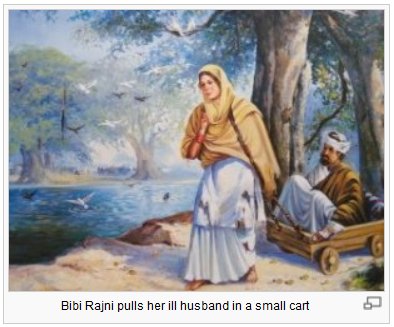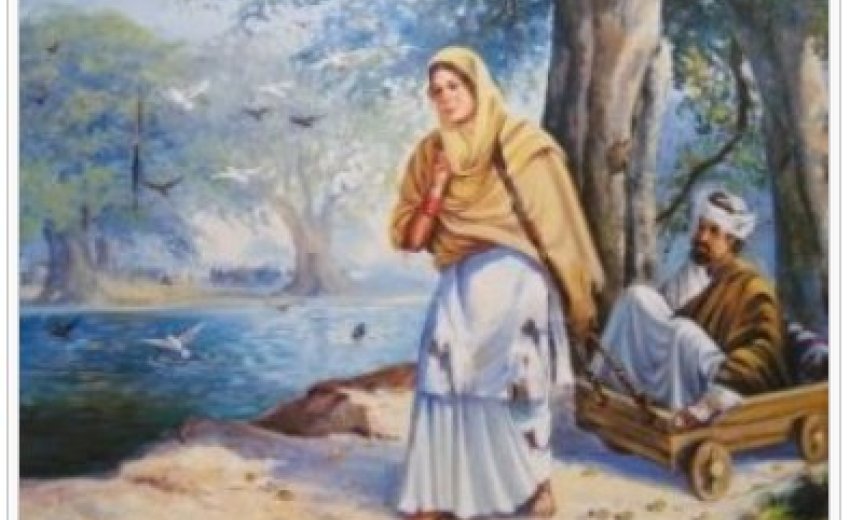Bībī Rajnī – Black Crows Flying as White as the Snow
 In the time of Gurū Rām Dās Jī there lived a Rājā who had a daughter called Rajnī. She was as beautiful and as pure as the light of the moon, and everybody who saw her was delighted. But all this was outshone by her deep love for VĀHIGURŪ JĪ and her compassion towards all those on whom fate had enjoined heavy burdens. Her father was completely different: hard-hearted and proud.
In the time of Gurū Rām Dās Jī there lived a Rājā who had a daughter called Rajnī. She was as beautiful and as pure as the light of the moon, and everybody who saw her was delighted. But all this was outshone by her deep love for VĀHIGURŪ JĪ and her compassion towards all those on whom fate had enjoined heavy burdens. Her father was completely different: hard-hearted and proud. One day he called for Rajnī and led her through his palace, whose precious marble floors were covered with the prettiest silk carpets and whose rooms were full of exquisite furniture and sparkled with gems. He stopped in one of those rooms, made a sweeping gesture with his arm and asked: "Rajnī, my dear child, today I have shown you all my treasures. Now tell me: Through whom do you live, me or GOD?"
Rajnī, who was deeply shocked, sank down at her father's feet, touched them with her hands as a gesture of respect and answered: "Father, dear father, what sort of question are you asking me? You know as well as I do that all this is only made possible by THE ONE: VĀHIGURŪ JĪ."
The king should have helped his daughter to her feet at once. But her unexpected answer first rendered him speechless and then made him furiously angry. He violently pushed Rajnī away with his foot in front of the appalled servants who had been following the two at due distance:
"VĀHIGURŪ JĪ, you say? You really dare tell me that? You, you…! VĀHIGURŪ JĪ! Who is that supposed to be? Has anyone ever seen HIM? It is me who has clad you in precious silk and brocade and who showers you with jewellery. Me! Me! No-one but me! Enough! You shall have a beggar for a husband, a disabled man, black with leprosy, and then you will see how VĀHIGURŪ JĪ provides for you.
And he had Rajnī's beautiful clothes and her splendid jewellery taken from her, put her in tatters instead and had her married to a leprous beggar. Immediately after the cheerless wedding he had both chased away from his gorgeous palace.
From that day on Rajnī lived in a squalid shed with her husband and was forced to work and to go begging to survive. But she never uttered a single word of complaint. She never reviled her husband and instead was devoted to him with all her heart as he was so gentle and always treated her well. Thus the months passed.
One day she went begging and took her husband with her some distance so she could put him down somewhere on the way lest he spend the whole day on his own in the dark shed. She saw a tree by the way and thought "There is a tree my husband can lean against, weak as he is." She helped him to lay down before continuing on her way.
The leper, leaning against the tree, looked around him and saw a watering hole not far away. A steady stream of crows was flying into the water and...but...he rubbed his eyes in surprise and, full of amazement, cried out: "What is going on? I see black crows bathing in the watering hole and flying away as white as the snow. Is that a sign from HIM? Is he sending me crows as messengers? Does HE want me to take a bath in that wonder-working water so I become healthy?"
The beggar, who was also filled with a deep love for GOD, painfully crept to the watering hole without hesitation and with an effort slid into the water. He was hardly in the water when – behold! – the divine miracle happened: His limbs began to straighten out, and a strength he had never known before flowed through them. He looked down at his body, full of amazement, and saw that his skin was recovering, too. As he was afraid that after this change Rajnī would not believe that he was her husband, he quickly lifted his little finger from the water so it would remain black.
When Rajnī returned to her husband after some time to bring him something to eat he was gone. In his place a comely youth was sitting in the tree's shadow. After Rajnī had looked around for her husband in vain for some time, she plucked up courage and addressed the youth: "Forgive me for addressing you, but have you seen my husband?"
"What does he look like? Is he very beautiful that you miss him so much?"
"Oh yes, he is beautiful from the bottom of his heart."
The youth stood up and said: "Rajnī, dear Rajnī. I am your husband and I see that you have loved me for my own sake." When he approached her to take her in his arms she became scared and shied away from him: "Oh, how can you taunt a poor woman like me? My husband..." but he interrupted her: "...is standing in front of you. Look, my little finger is still black. I left it like that for you so you would know the truth." And he told Rajnī everything that had happened. Deep joy and gratitude filled the hearts of those two pure human beings. Rajnī knelt down and thanked VĀHIGURŪ JĪ for his mercy.
Meanwhile the condition of Rajnī's father had become worse and worse. He grew very ill, and his servants took advantage of this illness to steal from him, while his ministers used his illness to scheme against each other and against him. Finally he was left without anything and became what he had made his daughter: a beggar. One day, walking around begging for food, he knocked at a door. The woman opening was his daughter, and they recognized each other at once. As any sort of hate was utterly foreign to her, she asked him to come in and eat. The former king, deeply ashamed, sat at the table with downcast eyes and for the first time after a long period of affliction satisfied his hunger. After the meal he looked up and glanced at his daughter and his son-in-law uncertainly. He saw nothing but the deepest love in their eyes, and this gave him the courage to ask: "Rajnī, where do you have all this from? You look so poor to me in all other respects."
 And, just as she had done one day a long time ago, she sank down at her father's feet and touched them with her hands: "Father, dear father, what sort of question are you asking me? You know as well as I do that all this is only made possible by THE ONE: VĀHIGURŪ JĪ."
And, just as she had done one day a long time ago, she sank down at her father's feet and touched them with her hands: "Father, dear father, what sort of question are you asking me? You know as well as I do that all this is only made possible by THE ONE: VĀHIGURŪ JĪ."The former king smiled, for he realized truth and, full of remorse, asked his daughter and his son-in-law for forgiveness. At the foot of the tree the Ammrit Sarovar came into being. The nameless tree became the Dukh Bhañjanī Berī, which still blossoms today and has helped many supplicators, for GOD's blessing is on it.
The Sākhī says: Those who never lose faith in VĀHIGURŪ JĪ, however severe their ordeals may be, will be rewarded by HIM in the end. This is precisely what happened to Bībī Rajnī.
In Alice Basarke's 'Champion of Women' Rajnī is the youngest daughter of Rāi Dunī Cand, a tax collector. When Rajnī and her sisters receive new clothes, one of them exclaims how well their father treats them. Rajnī points out that all of these things are coming from VĀHIGURŪ JĪ and that their father is but his medium. Her father, who has already become irritated at Rajnī's piety several times before that, overhears this discussion. He immediately marries his daughter to a leprous beggar and chases her away. This version of the story also has Rajnī's husband healed, but there is no reconciliation with her father.
It should be mentioned that the healing powers of the future Ammrit Sarovar are connected with the Tulsī (basil), which at that time was abundantly growing on its banks. Gurū Amar Dās Jī fetched Tulsī from here to make a poultice for Gurū Aṅgad Dev Jī's sore toe.
---------------------------------
Related Article:
http://www.sikhnet.com/gurbani/album/sakhibibirajni
